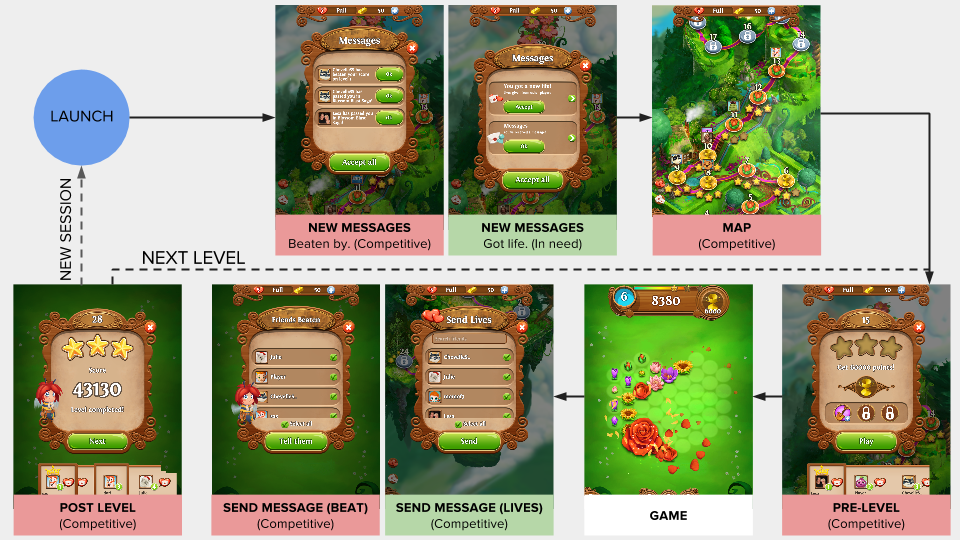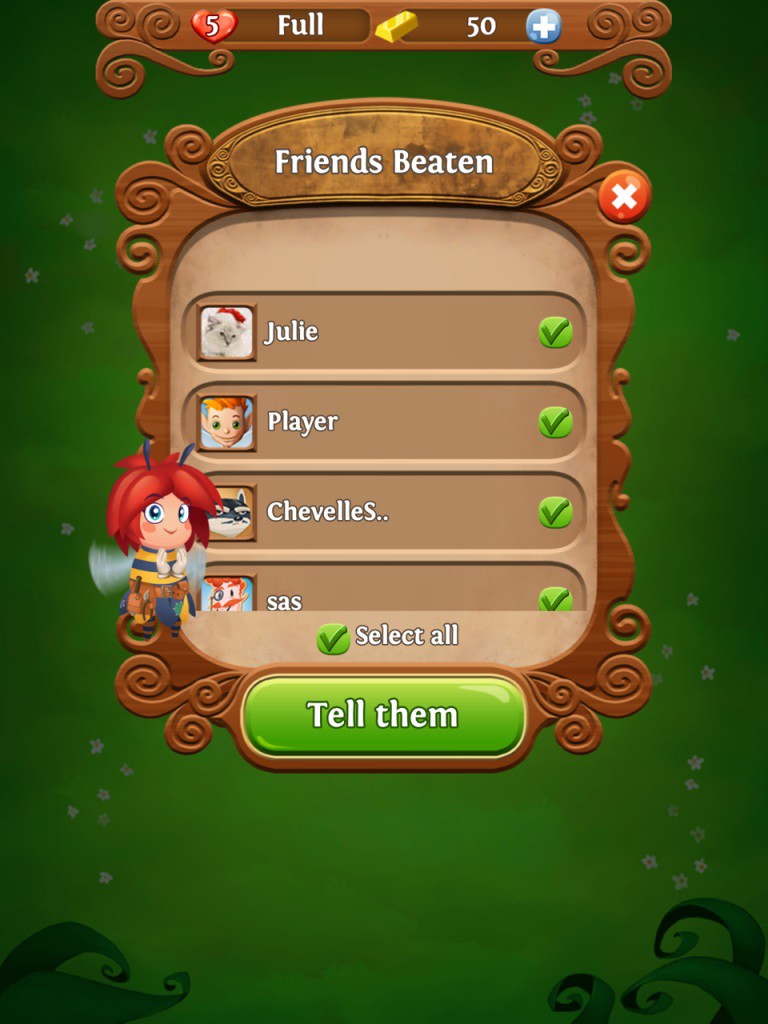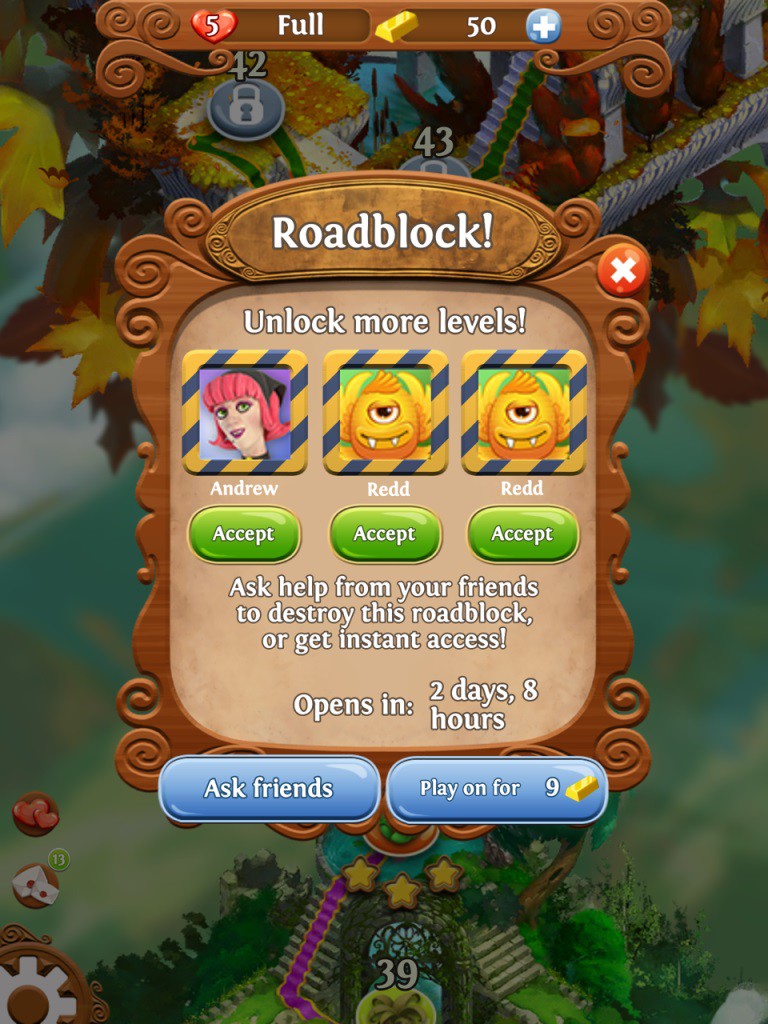Analyzing Blossom Blast Saga’s viral loop.
King, the company who rose to prominence during the heyday of Facebook games, has social gaming rooted deeply into their culture.
All of King’s games, including Candy Crush Saga and the latest, BBS (Blossom Blast Saga), make extensive use of Facebook’s social layer. Players are encouraged to send lives to their friends and to brag about beating their score. Before each level, players see their friends’ faces in a mini leaderboard, and they appear on that leaderboard themselves after they’ve beaten the level.
The effective peer pressure that King enforces on their Facebook players is an integral part of an already addictive gameplay. But what happens when mobile players don’t log in via FB?
Well, in BBS land, one will never walk alone. From the second session onward, guest players will be surprised to see the game populated with people they do not know. In other words, bots. Or in my lexicon..
Fictional friends
I’ve seen this technique in other games before, but BBS has really taken the fictional friends concept to another level. Not only do they appear on the map, but your fictional friends also brag about beating you and send you lives when you are in need. In turn, players can do the same and brag about their performance to the bots.
Let me repeat this last sentence. Players are encouraged to send an “I passed you on level 31!” message, to a bot. What the hell?
If you’ve read my latest post, you know that BBS is all about learning by doing. King is simulating social gameplay so players can experience firsthand how it feels to play with friends. When the time comes, they will convert from fictional friends to real (FB) friends.
BBS is being very methodical about how and when to convert users. This game will wear players down until resistance is barely an option. And the best part? The annoying “share on FB” button is barely evident. See how they do it below:
The Viral loop
In the flowchart you can see how the viral loop works.
There are two types of social interactions: competitive and when in need. Each type has conversion points at which players will hopefully convert.
As you can see, the loop looks very crowded. But bare in mind that these are only locations where the competitive/in need pop ups might appear. The frequency of those pop ups is different for every user segmentation.
Like the constant dripping of water that wears away the stone, BBS repeatedly and methodically exposes players to the brew of social conversion points until they finally give in.
Competitive Interactions
The first type of social interaction in BBS is competition, as the game constantly compares players’ scores whether they like it or not.
The progress map acts as a global leaderboard where players see what level their friends are on.
The in-level leaderboard is more interesting for competitive players because it contains a variable reward candy. Unlike the linear progression of the map, the in-level leaderboard is full of surprises. Did I pass my friends or not? Did I make it to #1?
The “competitive” conversion point occurs after a successful level, where the player has made some brilliant moves that got her to the top of the leaderboard. The competitive players are likely to get curious to see how well did they do vs. their real friends.
This is enhanced by the “friends beaten” pop-up, where players are encouraged to send their friends a message that they have beaten their score on a certain level.
This is a retention mechanism for competitive FB players, who fuel each other with bragging of that sort, thus increasing gameplay of both parties.
I believe that this appeals to a very small percentage of BBS players but, taking into consideration BBS’s high volume, it sums up to a significant number.
Friends in Need
BBS is more aggressive in converting players in need than converting competitive players for obvious reasons.
The typical conversion point for the player in need is when she runs out of lives.
Then, the player is reminded that she has some messages waiting for her in the inbox.
Those messages are lives, sent by the fictional friends. “Jolly!” screams the addicted user, and she then double taps the message to redeem her lives, only to be forced to log in via FB in order to get them. Psyched!
This happens as well on the soft gate, after level 40, where players are blocked on their way to the next level. There are 3 ways to pass this gate:
- Wait 60 hours
- Pay
- Get an approval from 3 friends
Players who quit the session and come back after an hour will find out that, when in need, fictionals are friends indeed. Players get approvals from 3 friends, but to redeem them… you guessed it. Log in via FB.
Desperate players are willing to do all sorts of stuff to just to continue playing. For them, logging in is a small price to pay.
Sum
Socially engaged players end up playing more, and their chances of spending money in the game rise significantly.
This is the reason that King takes their viral loop very seriously. So seriously that they will not let unregistered players play without it, and they come up with an array of bots to support it.
Take another look at the viral loop and see how methodical it is and how it toggles seamlessly between both interaction types, over and again, until the conversion happens.
While methodical, this is still a relatively dumb AI. Its wits are in its persistency.
Before long, fictional “friends” influence players to spend money on F2P games in much more sophisticated and intrusive ways. Consider chats, emails, FB messages and friend requests from bots. This is already happening.



